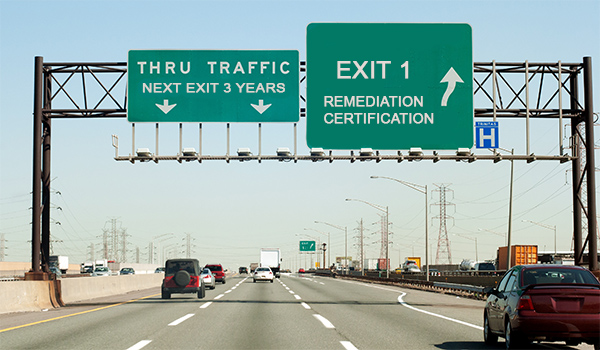
12 Sep ISRA’s Silver Lining: NJDEP Remediation Certification
Reading Time: 2 minutesHow NJDEP Remediation Certification can reduce time to closing a sale.
As we all know, if your property is subject to an ISRA action, you must undertake a series of environmental steps to demonstrate that the site is clean. Often, these steps can take months, if not years, to execute. But what if a sales transaction needs to be completed before the site is clean? Enter NJDEP’s Remediation Certification, an agreement between the buyer, the seller, and the NJDEP that allows a property to be sold without having fully completed the required ISRA cleanup. In this article, we explore this interesting and lesser-known component of ISRA.
Background
The Industrial Site Recovery Act (ISRA) has proven to be one of the most important environmental laws ever passed by the New Jersey Department of Environmental Protection (NJDEP). (For a primer on ISRA, read Triggered: The Industrial Site Recovery Act). Most ISRA cases close via one of two methods. Typically, your consultant will issue a Response Action Outcome (RAO) after a cleanup has been completed. Alternatively, a Licensed Site Remediation Professional (LSRP) can certify a Remedial Action Workplan (RAW) prior to proceeding with the ISRA-triggering activity. Because these two means of closure can be very time-consuming, if a deal needs to close quickly, it may make sense to pursue Remediation Certification.
NJDEP Remediation Certification
Remediation Certification is an agreement between the property owner/operator, the prospective purchaser, and the State of New Jersey. This agreement defines liabilities for the current owner/operator and the prospective purchaser and ensures that sufficient money is set aside to fund the cleanup. Understand, the Remediation Certification does not replace the need for full remediation and an eventual RAO. Instead, it provides a legal “off-ramp” so the sale can close while ensuring full regulatory compliance sometime hence. To do this, an ISRA Remediation Certification form must be completed, executed by both parties, and submitted to the NJDEP for its review.
One of the notable elements of the Remediation Certification is the establishment of a Remediation Funding Source (RFS) to ensure that the remediation will be fully funded. Also, the Remediation Certification will stipulate which party, either the current owner/operator or the buyer, will conduct, pay for, and complete the remediation.
While Remediation Certification is a beneficial option, it does not absolve either party of ISRA compliance liability. Consequently, ESA urges those parties who wish to pursue this option to obtain legal counsel with solid Remediation Certification experience. Your attorney will ensure that you fully understand the potential implications and benefits of the agreement.
Because ESA understands the subtle nuances of ISRA compliance, we urge you to Ask ESA all of your ISRA questions. Yes, we can help.
Additional ISRA Information
For a deeper dive into ISRA, check out Is Your Industrial Property Exempt from ISRA? This article explores the potential option of a De Minimis Quantity Exemption (DQE) filing, which, if approved by the NJDEP, allows certain industrial establishments that handle small amounts of hazardous substances to avoid the more involved ISRA compliance process.



